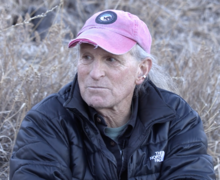
A pet, or companion animal, is an animal kept primarily for a person's company or entertainment rather than as a working animal, livestock, or a laboratory animal. Popular pets are often considered to have attractive/cute appearances, intelligence, and relatable personalities, but some pets may be taken in on an altruistic basis and accepted by the owner regardless of these characteristics.
Bioethics is both a field of study and professional practice, interested in ethical issues related to health, including those emerging from advances in biology, medicine, and technologies. It proposes the discussion about moral discernment in society and it is often related to medical policy and practice, but also to broader questions as environment, well-being and public health. Bioethics is concerned with the ethical questions that arise in the relationships among life sciences, biotechnology, medicine, politics, law, theology and philosophy. It includes the study of values relating to primary care, other branches of medicine, ethical education in science, animal, and environmental ethics, and public health.

Dog food is food specifically formulated and intended for consumption by dogs and other related canines. Dogs are considered to be omnivores with a carnivorous bias. They have the sharp, pointed teeth and shorter gastrointestinal tracts of carnivores, better suited for the consumption of meat than of vegetable substances, yet also have ten genes that are responsible for starch and glucose digestion, as well as the ability to produce amylase, an enzyme that functions to break down carbohydrates into simple sugars – something that obligate carnivores like cats lack. Dogs evolved the ability living alongside humans in agricultural societies, as they managed on scrap leftovers and excrement from humans.

A therapy dog is a dog that is trained to provide affection, comfort and support to people, often in settings such as hospitals, retirement homes, nursing homes, schools, libraries, hospices, or disaster areas. In contrast to assistance dogs, which are trained to assist specific patients with their day-to-day physical needs, therapy dogs are trained to interact with all kinds of people, not just their handlers.
Commercial animal cloning is the cloning of animals for commercial purposes, currently, including livestock, competition camels and horses, pets, medical uses, endangered and extinct animals, as first demonstrated in 1996 for Dolly the sheep.
The dog is a domesticated descendant of the wolf. Also called the domestic dog, it is derived from extinct Pleistocene wolves, and the modern wolf is the dog's nearest living relative. Dogs were the first species to be domesticated by hunter-gatherers over 15,000 years ago before the development of agriculture. Due to their long association with humans, dogs have expanded to a large number of domestic individuals and gained the ability to thrive on a starch-rich diet that would be inadequate for other canids.

Emotion is defined as any mental experience with high intensity and high hedonic content. The existence and nature of emotions in non-human animals are believed to be correlated with those of humans and to have evolved from the same mechanisms. Charles Darwin was one of the first scientists to write about the subject, and his observational approach has since developed into a more robust, hypothesis-driven, scientific approach. Cognitive bias tests and learned helplessness models have shown feelings of optimism and pessimism in a wide range of species, including rats, dogs, cats, rhesus macaques, sheep, chicks, starlings, pigs, and honeybees. Jaak Panksepp played a large role in the study of animal emotion, basing his research on the neurological aspect. Mentioning seven core emotional feelings reflected through a variety of neuro-dynamic limbic emotional action systems, including seeking, fear, rage, lust, care, panic and play. Through brain stimulation and pharmacological challenges, such emotional responses can be effectively monitored.
An emotional support animal (ESA) is an animal that provides relief to individuals with "psychiatric disability through companionship." Emotional support animals may be any type of pet, and are not recognized as service animals under the Americans with Disabilities Act.

Marc Bekoff is an American biologist, ethologist, behavioural ecologist and writer. He was a professor of Ecology and Evolutionary Biology at the University of Colorado Boulder for 32 years. He cofounded the Jane Goodall Institute of Ethologists for the Ethical Treatment of Animals, and he is Professor Emeritus of Ecology and Evolutionary Biology at the University of Colorado Boulder.

A free-ranging dog is a dog that is not confined to a yard or house. Free-ranging dogs include street dogs, village dogs, stray dogs, feral dogs, etc., and may be owned or unowned. The global dog population is estimated to be 900 million, of which around 20% are regarded as owned pets and therefore restrained.
Sentiocentrism, sentio-centrism, or sentientism is an ethical view that places sentient individuals at the center of moral concern. Both humans and other sentient individuals have rights and/or interests that must be considered.

Pauleen Charmayne Bennett is an Australian scientist researching anthrozoology at La Trobe University in Victoria, Australia.

Tatjana Višak, often credited as Tatjana Visak, is a German philosopher specialising in ethics and political philosophy who is currently based in the Department of Philosophy and Business Ethics at the University of Mannheim. She is the author of the monographs Killing Happy Animals and Capacity for Welfare Across Species, and the editor, with the political theorist Robert Garner, of The Ethics of Killing Animals.
Jan Deckers works in bioethics at Newcastle University. His work revolves mainly around three topics: animal ethics, reproductive ethics and embryo research, and genetics.
Frenetic random activity periods (FRAPs), also colloquially known as zoomies, scrumbling, or midnight crazies, are random bursts of energy occurring in dogs and cats in which they run frenetically, commonly in circles. They usually last a few minutes or less. It is not known what causes animals to engage in FRAPs.
Jeffrey Raymond Sebo is an American philosopher. He is clinical associate professor of environmental studies, director of the animal studies MA program, and affiliated professor of bioethics, medical ethics, and philosophy at New York University. In 2022, he published his first sole-authored book, Saving Animals, Saving Ourselves.

Compassionate conservation is a discipline which aims to combine the fields of conservation and animal welfare. Historically, these two fields have been considered separate and sometimes contradictory to each other. The foundational principles of compassionate conservation are: "Do No Harm; Individuals Matter; Inclusivity; Peaceful Coexistence".
Catia Faria is a Portuguese moral philosopher and activist for animal rights and feminism. She is assistant professor in Applied Ethics at the Complutense University of Madrid, and is a board member of the UPF-Centre for Animal Ethics. Faria specialises in normative and applied ethics, especially focusing on how they apply to the moral consideration of non-human animals. In 2022, she published her first book, Animal Ethics in the Wild: Wild Animal Suffering and Intervention in Nature.

Animal Ethics in the Wild: Wild Animal Suffering and Intervention in Nature is a 2022 book by the philosopher Catia Faria published by Cambridge University Press. It examines wild animal suffering as a moral problem. Faria contends that if we have a moral obligation to aid those in need, we should intervene in nature to prevent or alleviate the suffering of wild animals, as long as it is practical and leads to a net positive outcome.










